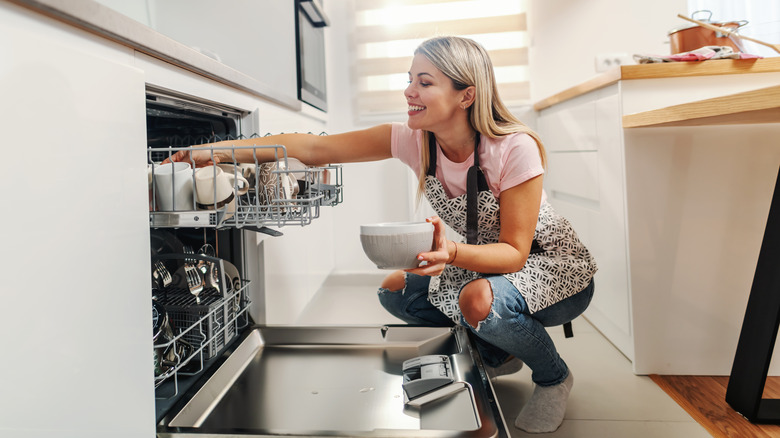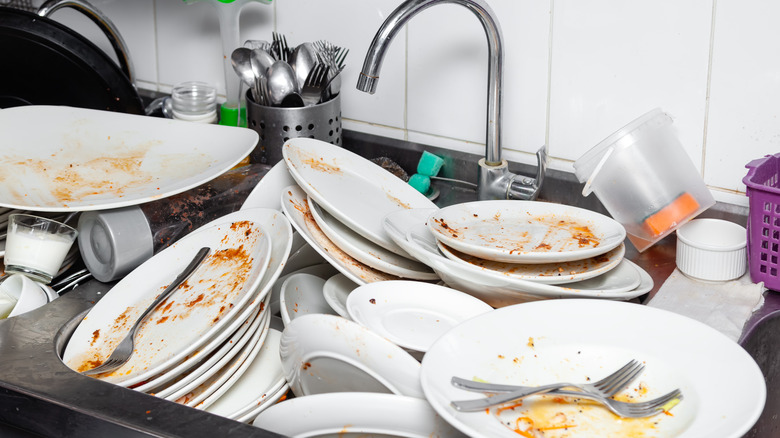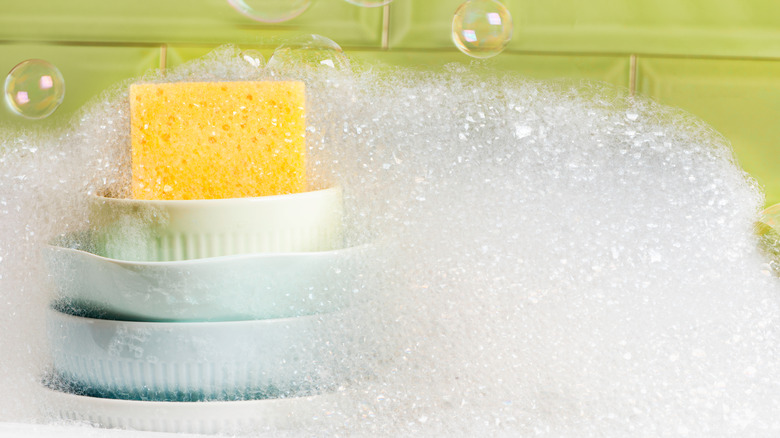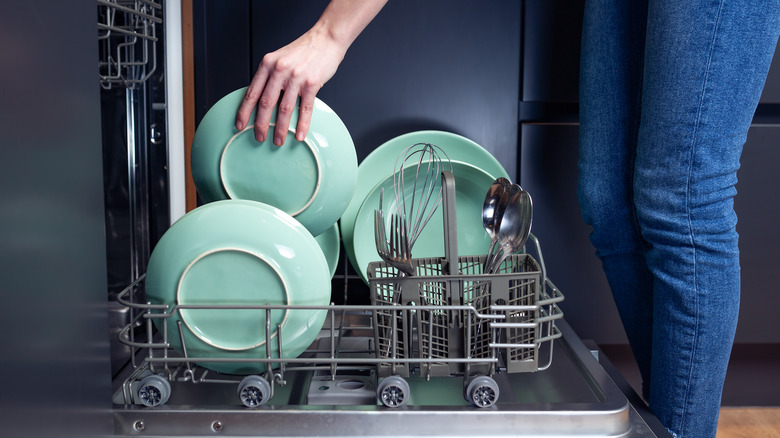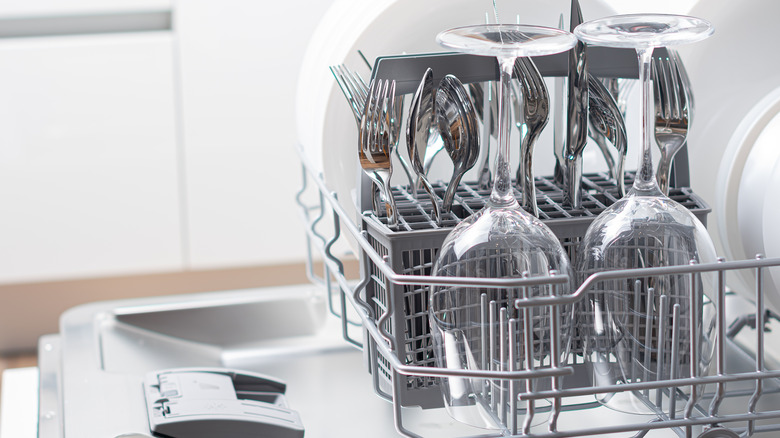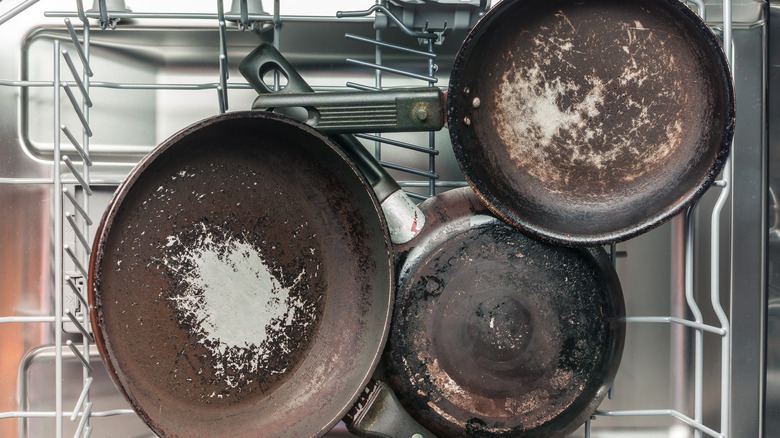Dishwasher Mistakes You've Been Making This Whole Time
The invention of the dishwasher has made most people's lives so much easier. Instead of laboring at the kitchen sink, soaping, rinsing, and drying dishes day in and day out, we can simply pop them into the machine, and let it do all the work. And since a dishwasher eliminates one of our least-favorite chores, no one wants to open the machine at the end of the cycle to find that their dishes are still crusted with food, spotty, or even cloudy. Most of us find using a dishwasher to be pretty foolproof. However, contrary to popular belief, there is more to it than just loading the dishes, sticking a detergent tab into the slot, and pressing the start button. We are all subject to making little mistakes that can compromise the cleanliness and lifespan of our dishes.
What if we here at House Digest told you that these issues can be easily fixed so that the next time you open your dishwasher, your dishes will all be sparkling clean? Keep reading to find out the common dishwasher mistakes you might be making and how to get the best clean from your machine.
Rinsing your dirty dishes before loading them in the dishwasher
According to ABC Everyday, you really shouldn't be pre-rinsing your dishes under the tap before loading them into the dishwasher. The logic behind this is to avoid clogging the dishwasher with bits of food and/or to make it easier for the machine to do its job. While you shouldn't be placing your dishes into the machine with mounds of caked-on food still stuck to them, it actually isn't necessary to pre-rinse your dirty dishes, either.
According to whitegoods expert at CHOICE, Ashley Iredale, "There's absolutely no need to pre-rinse. You may actually get worse results with your cleaning if you pre-rinse things than if you don't" (via ABC Everyday). Although it may sound counter-intuitive, the next time you load up your dishwasher, leave the sauce smudges and grime right where it is, and let your machine do all the work.
Using too much detergent in your machine
Many people hold the belief that more is better — including when it comes to dishwasher detergent. However, this is not the case. In fact, using too much detergent can cause your dishes to come out spotty or cloudy, a clear indication of soap residue. Too much detergent isn't just bad for your dishes, either. The soap can clog the drains and pipes leading out from the machine, which can cause backups into your dishwasher (via The Kitchn). Even the pre-packaged dishwasher pods that are increasingly more popular these days often contain too much cleaning power for one load of dirty dishes. You're better off just going with a box of powdered detergent and cutting the recommended amount by a third or even half.
In an interview with the New York Times, repairman and author Vernon Schmidt states that using too much detergent is one of the biggest and most common mistakes people make. "Most people use 10 to 15 times the amount of soap they need." Not only does this cause problems with your dishwasher, it's also money you end up wasting.
If you are having issues with soap residue on your dishes or clogged dishwasher parts or if you simply like saving money, try using less detergent next time you run a cycle.
Overfilling the dishwasher
Another understandable mistake people make when loading their dishwasher is stuffing it to the brim with dirty dishes. You may be thinking that squeezing as many dishes as possible onto the racks will ultimately save resources in the long run, but it may be having the opposite effect. When you overfill your dishwasher, your dishes end up coming out less clean than they would have if you had left a few dishes in the sink to wait for the next cycle. This potentially leads to you having to either manually rinse the dishes that haven't been properly cleaned or run them through an additional cycle, which ultimately wastes the same resources you were trying to save.
According to Horizon Services, overloading the dishwasher is also a common culprit behind leaking. When the water is diverted away from the tank bottom, it can spray out through the bottom of the door and onto your kitchen floor. That sounds like a headache no one wants to have!
Make sure you properly space your dishes to allow the water and detergent access to the entire dish or utensil and ensure a thorough cleaning.
Washing items that are not dishwasher-safe
You should always check that the item you're placing in the dishwasher is actually dishwasher-safe. Normally, this information is written on the product itself or the packaging it comes in. If you can't find the information in these two places, try a simple Google search to see if the manufacturer has a website where you can find out. Even if you know an item is not dishwasher-safe, you may be tempted to plop it in there anyways to save yourself the hassle of having to hand wash. However, machine washing a product that is not dishwasher safe is a big no-no.
Dishwasher expert Ashley Iredale warned, "Your dishwasher's a pretty harsh environment with lots of water, heat, and high alkalinity, and it can do a lot of damage to non-dishwasher safe items" (via Choice). For example, wood items can split or fade in the dishwasher while delicate glass items such as wine glasses can scratch or break against other items. Even one cycle in the dishwasher can drastically reduce the life of these products, meaning you'll need to shell out the money to replace them pretty soon after.
It may be inconvenient to hand wash non-dishwasher safe items, but it'll pay off in the long run.
Washing your pots and pans in the dishwasher
Just like with non-dishwasher-safe items, it's tempting to put your pots and pans in the dishwasher as well to save time. Some manufacturers even advertise their pans as dishwasher-friendly. However, as a general rule of thumb, you should avoid washing your pots and pans in the dishwasher even if you think no harm can be done. Harsh dishwashing detergents can harm the protective coating that prevents food from sticking to the surface during cooking, making it chip and flake off. Once the coating starts to chip, it can leak harmful toxins out into whatever you're cooking (via The Spruce). Even uncoated pots and pans build up a layer of protective coating through continued use that acts in the same way. Other issues people come across when washing their pots and pans in the dishwasher are handles and seals becoming loose and potentially falling off.
If you're facing a hard, stuck-on layer of food, the best thing you can do for cast-iron pans, for example, is to hand wash them with salt. This will provide the friction you need to scrub off the gunk without destroying the surface. You can address pesky stains on stainless steel pans with boiling water and vinegar, while stains on copper pans will likely come clean with a lemon juice-baking soda paste (via Taste of Home).

